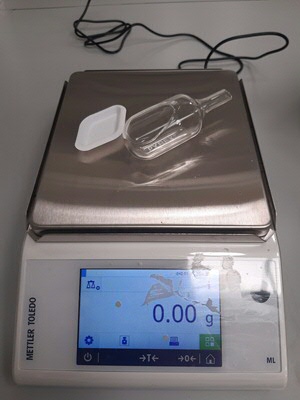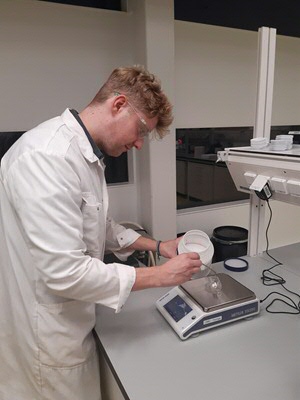Laboratories are going green
Conducting your research in the most environmentally friendly way possible, one might think that this is a common method for scientists. However, this is not the case yet. Thomas Freese, coordinator of the LEAF project and member of Green Labs, is trying to bring about change.
LEAF (Laboratory Efficiency Assessment Framework) is a user-friendly programme developed in England that helps scientists to conduct their lab work in a more environmentally friendly way. This programme is being deployed within the LEAF project to make the laboratories of the Faculty of Science and Engineering (FSE) more sustainable.
Researchers fill in their data while they are working, for example they report how often they open a fridge and whether they work with single-use plastics. The programme then calculates the lab’s environmental footprint and tells the users how much water, money, waste, and energy they can save by working in a more sustainable manner. For example, it is more sustainable to use glass instead of plastic, to turn off unused equipment and to recycle their waste.

Checklists
In addition to the online programme, cards and checklists throughout the lab remind users to turn off unused equipment and to save cooling water by slowing down the flow. According to Freese, a change in mindset is the most important factor. It should be a habit to only turn on equipment when needed, instead of placing signs to encourage users to turn it off. That is truly sustainable thinking.
To check whether laboratories are on the right track, LEAF coordinators come by unannounced to observe the workflow in the lab. They give scientists tips and tricks for working in a more sustainable way. Depending on how well they implement the advice, the labs receive a label: bronze, silver, or gold. Currently, there are already four laboratories with a bronze label on the seventh and ninth floor of the Linnaeusborg.

Green Labs
The LEAF project is part of Green Labs, an initiative from the University of Groningen to make the laboratories of the FSE more sustainable. The LEAF project is still in the pilot phase. The goal is to implement LEAF in the entire Faculty. A Green Labs team of about 20 people from different backgrounds who contribute to the pilot has been formed. These volunteers have an interest in sustainability and climate and find it important to contribute to a greener future.
The team is divided into special working groups that brainstorm sustainable alternatives for laboratories. For example, one team recently investigated whether a special dishwashing machine for pipette tips can bring down the plastic waste production. The UG has set up a fund for this type of green innovations. LEAF also collaborates with other Dutch universities to stay up to date with the newest developments in sustainability.

Freese is working towards obtaining his PhD at the Stratingh Institute for Chemistry and is consciously aware of his environmental impact. He drives an electric car and does not eat meat. Because of his work at Green Labs he has become more aware of his contribution to climate change and what kind of impact this has on the environment. Universities need to change too, according to Freese. Universities publish various studies that call for measures to limit climate change, however their own contribution is still limited. In Freese’s opinion, that needs to change. With the LEAF project he hopes to bring about change within the UG.
Check out the article ‘Preaching water while drinking wine: Why universities must boost climate action now’ written by Borgermann et al.
Want to know more? Take a look at the Green Labs and LEAF project website, and also the website of Green Office, which initiated the Green Labs project, organized kick-off meetings and created materials like the lab cards and labels.
(Text: Myrna Kooij)
More news
-
29 January 2026
Microplastic research - media hype or real danger?
-
27 January 2026
ERC Proof of Concept grant for Maria Loi
